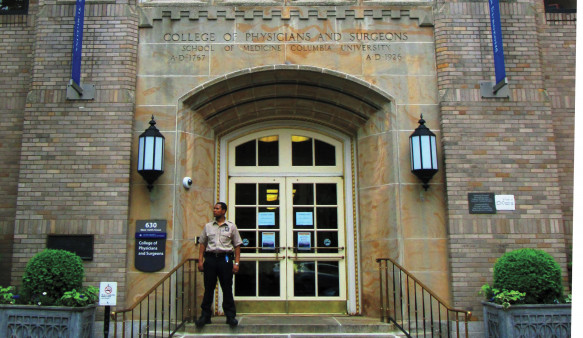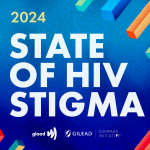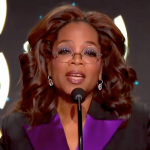Former POZ magazine cover subject Marvell Terry II has a new role in HIV advocacy. He is the new project manager and community engagement lead of the Accelerating Implementation of Multilevel-strategies to Advance Long-Acting Injectables for Underserved Populations (ALAI UP) Project at the Aaron Diamond AIDS Research Center of Columbia University’s Vagelos College of Physicians and Surgeons. Cabenuva (cabotegravir plus rilpivirine) is the first long-acting injectable HIV treatment and is administered by a health care provider monthly or every other month.

Marvell Terry IICourtesy of Marvell Terry II
Previously, Terry raised awareness and promoted education and resources for Black LGBTQ people in the South with his annual conference, the Saving Ourselves Symposium, now hosted by the Southern AIDS Coalition. He has also worked at the Human Rights Campaign Foundation and the Southern HIV Impact Fund at AIDS United.
Terry recently sat down for a chat about this next step in his career with his friend and colleague DaShawn Usher, currently the director of communities of color and media at GLAAD, an LGBTQ media advocacy organization.
What does your new role entail?
As project manager, I work internally with the leadership team to manage the execution of the ALAI UP Project efficiently and effectively. Externally, I work with eight clinics from across the United States that provide clinical and wraparound services to underserved populations to ensure that this first form of injectable treatment reaches those who need it the most as quickly as possible.
In my community engagement lead role, I work with those eight clinics to ensure that in the pre-implementation phase, clinics are meeting with, listening to and hearing from the community. I work with clinics to ensure that listening sessions are happening and the voices of underserved populations inform implementation.
Once sites are selected, I work to increase representation of people living with HIV on our project advisory board from those geographic areas in which we are working—and, importantly, I ensure that those newer members feel included and their perspectives are valued.
I also feel a sense of responsibility, working now at a large Ivy League institution with many academics, to ensure we are intentional in our work with the community and to ensure we are effective and efficient.
I want to ensure that we not only interrogate the numbers but also reflect on the faces and lives of underserved populations and remember that our work is to serve them where so many other systems have failed them.
Tell us more about ALAI UP.
ALAI UP is part of the Special Projects of National Significance Program funded by the Health Resources Services Administration. ALAI UP is focused on supporting clinics across the United States to deliver long-acting injectable HIV treatment to make progress toward health equity and ensure that all people with HIV can remain engaged in HIV care and achieve and sustain viral suppression.
I manage a large team of folks at Columbia University’s Vagelos College of Physicians and Surgeons, the New York City Department of Health and Mental Hygiene, City University of New York and the Southeast AIDS Training and Education Center in Nashville.
My role is to make sure that we are on track to use their combined expertise in implementation science, clinical service delivery, capacity building, monitoring and evaluation; [to show] a deep commitment to anti-stigma and anti-racism; and to create tools and resources that are specifically designed to make it possible that this new injectable form of treatment is implemented equitably from day 1—instead of trying to “fix” inequity in its implementation later.
What about this role appeals to you?
I can recall sitting in the 2015 Policy and Advocacy Summit in Baltimore, organized by the National Black Gay Men’s Advocacy Coalition’s Young Black Gay Men’s Leadership Initiative. This meeting convened young Black gay men from around the United States, and I had a role on the organizing committee that year.
A young Black gay man from the South stood up in deep anger because of how long it took pre-exposure prophylaxis (PrEP) to get to the Black community and then to underserved areas of the United States. That moment—the emotion, the pleading from Black gay men—has stayed with me for years.
This role appealed to me because we cannot allow this new tool—theoretically available in our tool kit right now and yet still only used by probably less than 1,000 people across the United States—to reach underserved populations as slowly as PrEP did. We must get this right because I believe this injectable formulation is only the first one—and that other, more advanced medications will follow.
What we learn in this project could show that a different path—one that prioritizes equity—is possible when new groundbreaking medications, or one day even a cure, are here. As a person living with HIV, the role is also personal. We must ensure long-acting injectables for treatment are accessible to everyone, regardless of where you live or the type of insurance you have.
How does it feel to live in New York City?
I can remember coming to New York to visit you and telling myself I would never want to live here. I did not see it. I am from Memphis, and there were certain aspects of New York that were just foreign to me, like public transportation and the bodegas and the noise.
But after spending some time in Washington, DC, and Atlanta, living in New York seemed increasingly realistic to me. I look forward to leaning into what New York has to offer in the daytime and nighttime, engaging with creatives and blossoming in that area and becoming one of New York’s most eligible unmarried people. [Laughs]
You’re from Memphis, where yet another video was taken of a Black man experiencing police brutality. Tyre Nichols was brutally beaten by five police officers and died as a result. How does this movement respond?
I grew up in the ZIP code where it happened. My activism started in Memphis, so it means a lot to me. I often do not know what to do with the rage that comes because of these incidents. I do go to therapy, and I have learned to channel that rage into my work. I do that by ensuring that the systems in which I work see my Black body, learn of my Black experiences and hear my Black voice.
HIV organizations have a responsibility, I believe, to speak out against the injustices experienced by the individuals who receive care from them. Social injustices impact one’s medical adherence. They impact one’s ability to see a doctor in person and even impact how an individual receives care. Equitable care, or the lack thereof, impacts how I feel about myself emotionally, mentally and physically.
This is the work I do with clinics in my community engagement lead role: to ensure they see, hear and learn about the community in which they are serving to ensure equitable access to treatment. It is time to challenge HIV organizations that put out ally statements during the summer of 2020 during the height of the Black Lives Matter movement and push them to examine their own practices and make change.
What matters to you in this moment?
After COVID-19 and the racial reckoning this country had in 2020—and is still having—what matters to me the most are honest and authentic relationships.
What matters to me is my voice as a Black man and having the ability to cultivate it and not allow systems or institutions to smother or manipulate it.
It is important for me to be as fearless as possible in this season of my life. Much of this will take consistent work, a measured approach, continued therapy and surrounding myself with the right people. Then some of this is simply about me saying yes to opportunities.
Follow Marvell Terry II at facebook.com/marvell.terry and twitter/marvellous2thet. Go to alai-up.org for more about ALAI UP.







1 Comment
1 Comment